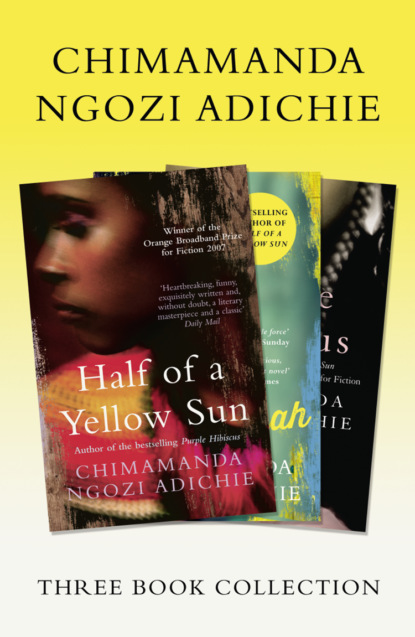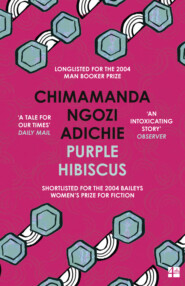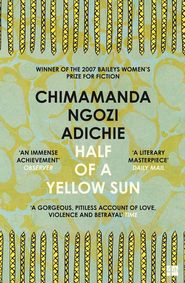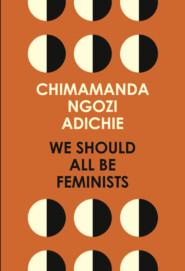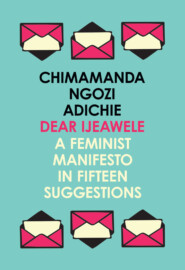По всем вопросам обращайтесь на: info@litportal.ru
(©) 2003-2024.
✖
Half of a Yellow Sun, Americanah, Purple Hibiscus: Chimamanda Ngozi Adichie Three-Book Collection
Автор
Год написания книги
2018
Настройки чтения
Размер шрифта
Высота строк
Поля
He picked up the orange and held it out to her but she did not take it. She got up and walked to the railing.
‘War is coming,’ she said. ‘Port Harcourt is going crazy.’
She was looking in the far distance, as if she could actually see the city in its frenzy of excessive parties and frenetic couplings and speeding cars. Earlier that afternoon, a well-dressed young woman had come up to Richard at the train station and taken his hand. ‘Come to my flat. I never do it with oyinbo man before, but I want try everything now, oh!’ she had said, laughing, although the delirious desire in her eyes was serious enough. He had shrugged his hand free and walked away, strangely sad at the thought that she would end up with another stranger in her bed. It was as if the people in this city with the tall, whistling pines wanted to grab all they could before the war robbed them of choices.
Richard got up and stood beside Kainene.
‘There won’t be war,’ he said.
‘How did she ask about me?’
‘She said, How is Kainene?’
‘And you said I was well?’
‘Yes.’
She said nothing else about it; he did not expect that she would.
15 (#u3c1576f1-c916-57b7-bb43-a63c028a7109)
Ugwu climbed out of the car and went around to the boot. He placed the bag of dried fish on top of the larger bag of garri, hoisted both onto his head, and followed Master up the cracked stairs and into the dim building that was the town union office. Mr Ovoko came up to meet them. ‘Take the bags into the store,’ he told Ugwu, pointing, as if Ugwu did not know from all the times he had come in the past to bring food for the refugees. The store was empty except for a small bag of rice in the corner; weevils crawled all over it.
‘How are things? A na-emekwa?’ Master asked.
Mr Ovoko rubbed his hands together. He had the lugubrious face of one who simply refuses to be consoled. ‘Nobody is donating much these days. These people keep coming here and asking me for food, and then they start to ask for jobs. You know, they came back from the North with nothing. Nothing.’
‘I know they came back with nothing, my friend! Don’t lecture me!’ Master snapped.
Mr Ovoko moved back. ‘I am only saying that the situation is serious. In the beginning our people rushed to donate food, but now they have forgotten. It will be a disaster if war comes.’
‘War will not come.’
‘Then why has Gowon continued to blockade us?’
Master ignored the question and turned to leave. Ugwu followed.
‘Of course people are still donating food. That dull fellow must be taking the food to his own family,’ Master said, as he started the car.
‘Yes, sah,’ Ugwu said. ‘Even his stomach is very big.’
‘That ignoramus Gowon pledged a miserable, measly amount for more than two million refugees. Did he think it was chickens that died and it is the surviving relatives of those chickens who have returned home?’
‘No, sah.’ Ugwu looked out of the window. It filled him with sadness, coming here to give garri and fish to people who had fed themselves in the North, listening week after week to Master saying the same things. He reached out and straightened the rope that dangled from the rearview mirror. The plastic keepsake attached to it was a painting of half of a yellow sun on a black background.
Later, as he sat on the backyard steps reading The Pickwick Papers, stopping often to think and to watch the slender leaves of corn swish in the breeze, he was not surprised to hear Master’s raised voice from the living room. Master was always short-tempered on days like this.
‘And what about our university colleagues in Ibadan and Zaria and Lagos? Who is speaking out about this? They kept silent while white expatriates encouraged the rioters to kill Igbo people. You would be one of them if you didn’t happen to be in Igboland! How much sympathy can you have?’ Master shouted.
‘Don’t you dare say I have no sympathy! To say that secession is not the only way to security does not mean I don’t have sympathy!’ It was Miss Adebayo.
‘Did your cousins die? Did your uncle die? You’re going back to your people in Lagos next week and nobody will harass you for being Yoruba. Is it not your own people who are killing the Igbo in Lagos? Didn’t a group of your chiefs go to the North to thank the emirs for sparing Yoruba people? So what are you saying? How is your opinion relevant?’
‘You insult me, Odenigbo.’
‘The truth has become an insult.’
There was silence and then the squeaking sound of the front door being opened and banged shut. Miss Adebayo had left. Ugwu stood up when he heard Olanna’s voice. ‘This is unacceptable, Odenigbo! You owe her an apology!’
It frightened him to hear her shout because she rarely did, and because the last time he had heard her shout was during those fractured weeks before Baby’s birth, when Mr Richard stopped visiting and everything seemed to be on the brink of drowning. For a moment Ugwu heard nothing – perhaps Olanna, too, had walked out – and then he heard Okeoma reading. Ugwu knew the poem: If the sunrefuses to rise, we will make it rise. The first time Okeoma read it, the same day the Renaissance newspaper was renamed the Biafran Sun, Ugwu had listened and felt buoyed by it, by his favourite line, Claypots fired in zeal, they will cool our feet as we climb. Now, though, it made him teary. It made him long for the days when Okeoma recited poems about people getting buttocks rashes after defecating in imported buckets, the days when Miss Adebayo and Master shouted and yet did not end the evening with her storming off, the days when he still served pepper soup. Now, he served only kola nut.
Okeoma left a little while later, and Ugwu heard Olanna’s voice rise again. ‘You must, Odenigbo. You owe her an apology!’
‘It is not a question of whether or not I owe her an apology. It is a question of whether or not I spoke the truth,’ Master said. Olanna said something Ugwu did not hear and then Master spoke in a calmer tone, ‘All right, nkem, I will.’
Olanna came into the kitchen. ‘We are going out,’ she said. ‘Come and lock the door.’
‘Yes, mah.’
After they left in Master’s car, Ugwu heard a tap on the back door and went to see who it was.
‘Chinyere,’ he said, surprised. She never came over this early, and never to the main house either.
‘Me and my madam and the children are leaving tomorrow morning for the village. I came to tell you to stay well. Ka o di.’
Ugwu had never heard her say so much. He was not sure what to say. They looked at each other for a while.
‘Go well,’ he said. He watched her walk to the hedge that separated the two compounds and slip underneath it. She would no longer appear at his door at night and lie on her back and spread her legs silently, at least not for a while. He felt a strange crushing weight in his head. Change was hurtling towards him, bearing down on him, and there was nothing he could do to make it slow down.
He sat down and stared at the cover of The Pickwick Papers. There was a serene calm in the backyard, in the gentle wave of the mango tree and the winelike scent of ripening cashews. It belied what he saw around him. Fewer and fewer guests visited now, and in the evenings the campus streets were ghostly, covered by the pearly light of silence and emptiness. Eastern Shop had closed. Chinyere’s mistress was only one of many families on campus who were leaving; houseboys bought huge cartons in the market and cars drove out of compounds with their boots sunken by heavy loads. But Olanna and Master had not packed a single thing. They said that war would not come and that people were simply panicking. Ugwu knew that families had been told they could send women and children to the hometowns, but the men could not leave, because if the men left it would mean that they were panicking and there was nothing to panic about. ‘No cause for alarm’ was what Master said often. ‘No cause for alarm.’ Professor Uzomaka who lived opposite Dr Okeke had been turned back three times by the militiamen at the campus gates. They let him pass the third day after he swore that he would come back, that he was only taking his family to their hometown because his wife worried so much.
‘Ugwuanyi!’
Ugwu looked up and saw his aunty coming towards him from the front yard. He stood up.
‘Aunty! Welcome.’
‘I was knocking on the front door.’
‘Sorry. I did not hear.’
‘Are you alone at home? Where is your master?’
‘They went out. They took Baby with them.’ Ugwu examined her face. ‘Aunty, is it well?’
She smiled. ‘It is well, o di mma. I bring a message from your father. They will have Anulika’s wine-carrying ceremony next Saturday.’
‘Eh! Next Saturday?’





